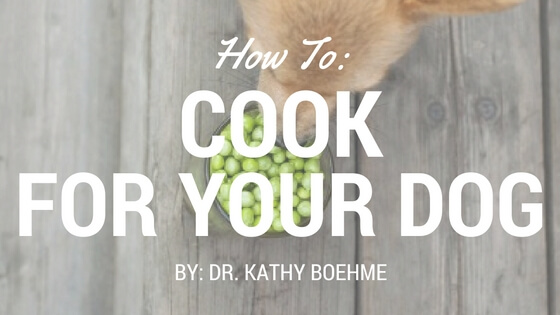
By Dr. Kathy Boehme
In honor of National Holistic Pet Day on August 30, I would like to begin with the quote attributed to Hipppocrates: “Leave your drugs in the chemist’s pot if you can heal the patient with food.”
I also love this quote by Paul Reynolds: “Since the dawn of mankind, what one eats has been related to how long and how well one can survive in the world.” I know this quote was intended for humans, but it could just as easily pertain to our pets.
The simple answer to the question, “Can I cook for my dog?” is “Of course!”

Photo Credit: Martin Cathrae Flickr
The caveat is that if a home cooked diet will be fed exclusively, it needs to be balanced. In fact, any diet that consists of more than 20 percent cooked food should be balanced as long-term imbalances often lead to nutritional deficiencies and disease.
That said, any home cooked food is better than none. No matter how high quality the kibble is, it is still a highly processed diet and in most cases, full of processed carbohydrates, which we know from human health is not ideal. Kibble diets are adequate for nutritional requirements and millions of dogs do great on them, but in my opinion, they are not ideal unless they are also supplemented with fresh whole foods.
Many of my clients know that I advocate feeding a variety of vegetables (and even feed them to my own dog). I can count on one hand the number of dogs that I do not recommend veggies for and it is primarily because these pets are so spleen deficient (the spleen is the controller of digestion in Chinese medicine) that they simply cannot break down and absorb them. For most dogs, however, vegetables are a great source of beneficial fiber, antioxidants and phytonutrients.
Most dogs love vegetables, but if you have a picky dog, it is likely he/she will eat some veggies and not others. All vegetables should be cooked or shredded for optimal antioxidant absorption, though you can feed chopped greens and sprouts raw. I know many people feed raw carrots, but ideally, they should be cooked. You can boil carrots and keep them in the refrigerator for treats. Green beans work great as treats, as well. Shoot for 1/4 cup of vegetables per 10 to 15 pounds of body weight.

It is very unusual for dogs with food allergies to be allergic to non-starchy vegetables, so even dogs on prescription diets can benefit from partially home cooked meals. The only restrictions are no high calcium or oxalate veggies like spinach for dogs with a history of calcium oxalate stones and of course, no onion family or grapes or raisins for any dog.
If you have ever thought about cooking for your pet, I encourage you to do it under the supervision of your veterinarian. There are a plethora of books that contain pet food recipes, but they are certainly not all created equal. I use recipes from several different sources, including:
“The Pet Lover’s Guide to Natural Healing for Dogs and Cats” by Dr.Barbara Fougere
“Fresh Food & Ancient Wisdom: Preparing Healthy & Balanced Meals for Your Dogs” by Dr. Ihor Boska
“Home-Prepared Dog & Cat Diets” by Dr. Patricia Schenk
These books were all written by veterinarians with extensive nutritional experience. It is important to remember that just as people do well on some types of food and not others, each pet is an individual, so what works for one will not necessarily work for another. That is actually one of the advantages of home prepared diets; they can be modified to the individual.
Also remember that any dietary changes should be done slowly over days to weeks, especially if there is a history of recurrent gastrointestinal problems. When we make a diet change, we are asking the gut flora to change as well and this should be done gradually. Pets should also be weighed at least monthly for several months after a change in diet so the amount of food may be adjusted.

For pets with specific medical conditions, a diets may be formulated by a veterinary nutritionist through the UC Davis Veterinary College Nutritional Consultation Service (we have forms for the service at our office) or through www.balanceit.com, which works with nutritionist Sean Delaney, DVM, MS, DACVN. These veterinarians are willing to work with specific ingredients if food allergies are present.
Diet will not fix every disease (though I suspect it is the root cause of many), but it will fix some, improve others and ultimately help your pet feel better.
Happy cooking!

